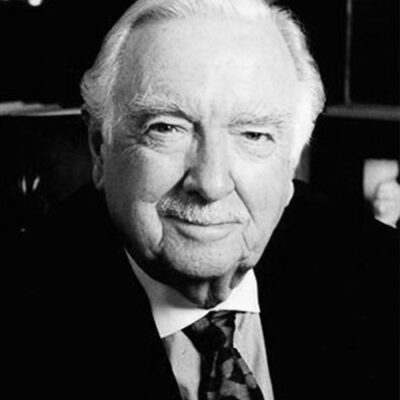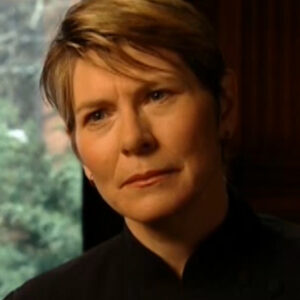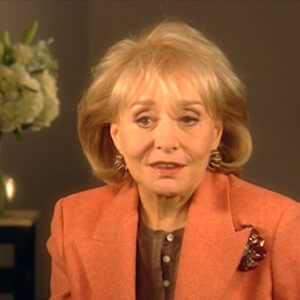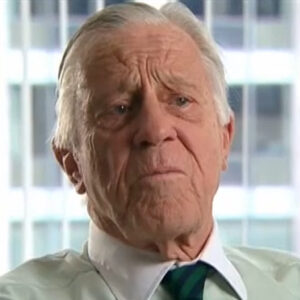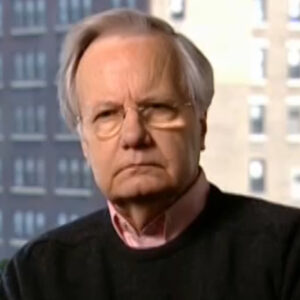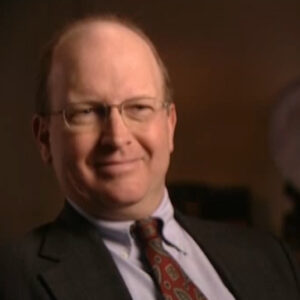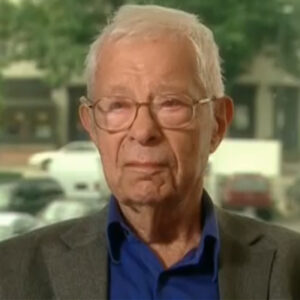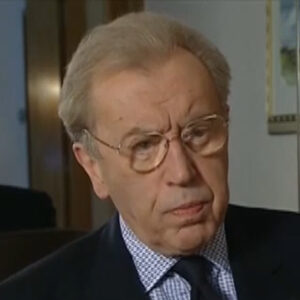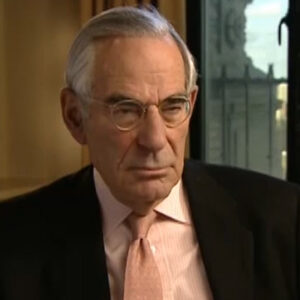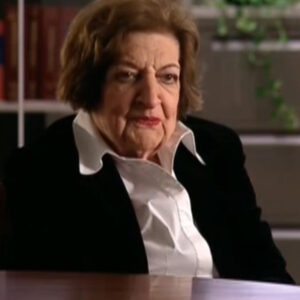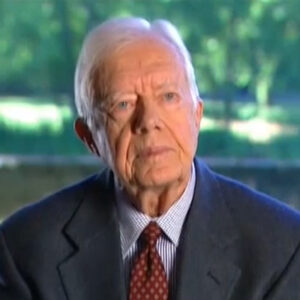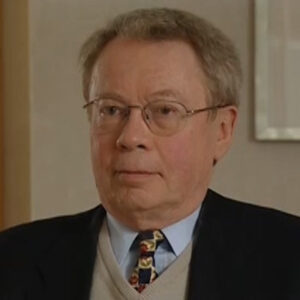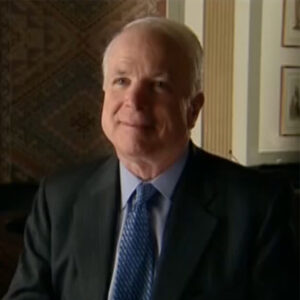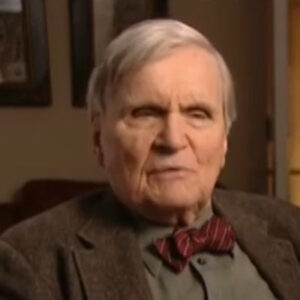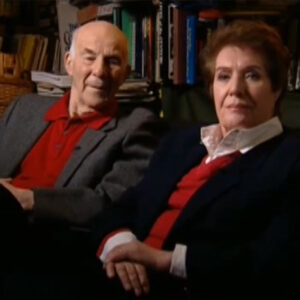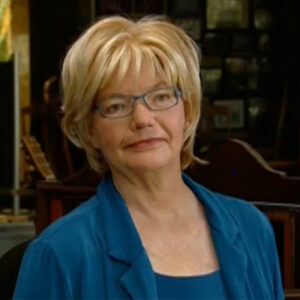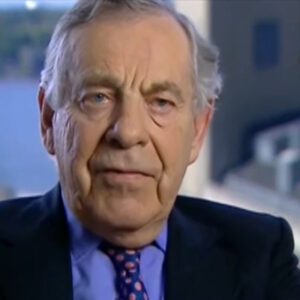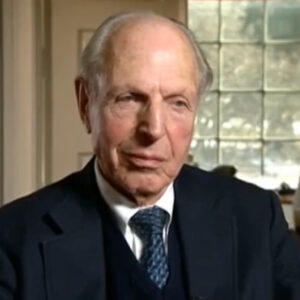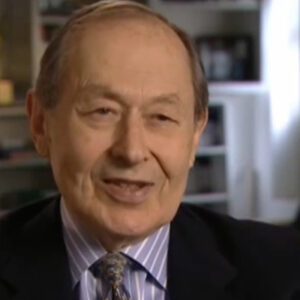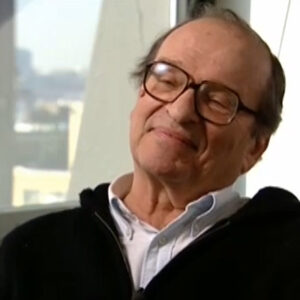Speaker To keep it going, unlike Jim, who just stays in there. OK.
Speaker Well, since we started off heavily Brinkley, I think I’d love to sort of talk a little bit about what happened steps.
Speaker I started off and he was sort of the anchor person and then all of a sudden were saying, and the competition between CBS and NBC a little bit about what happened, that NBC sort of became the preeminent network.
Speaker I think Huntley and Brinkley expressed the ethos at the beginning of the 60s better than Cronkite did. It was a lighter touch with the show, and it had and I worked for that program quite a lot as a correspondent. And it sort of fitted the gaiety and the less, I don’t know, the sort of less pessimistic view of the world of Kennedy himself embodied. And which lasted until the Kennedy assassination began to usher in a period of darkness in the American psyche, out of which Cronkite’s solidity and reliability and even stability at times seemed more appropriate to the time. So in Brinkley, while solid, had a head and an air of gaiety and lightheartedness about it, which CBS didn’t have at the time, and. But later in the decade, Cronkite reemerged and I think very fittingly and in a way, Cronkite came to be the sort of the personification of his era and and became the kind of the media figure of his time. Very few people are ever in history, except maybe political and military leaders are the embodiment of their time.
Speaker And Cronkite seemed to be no account for that quality. Well.
Speaker A. Let’s just let me think for a.
Speaker Cronkite.
Speaker Cronkite had a way of expressing the fundamental decency of the American character. And he took the institutions of American life seriously.
Speaker And he came from a solid reporting background, starting with United Press and through the Second World War. That wasn’t. Where it where it wasn’t fitting to ridicule the institutions were so used. Now everybody making fun of everything. And that was some Cronkite’s way. Cronkite was a man from Texas.
Speaker But in a sense, as essentially a kind of middle Westerner who came to embody American values of gravity and decency and optimism and.
Speaker Forged by the war or scarred by the war?
Speaker And he also.
Speaker Cronkite became he was the expression of American optimism and joy in American achievements through the space program with which he was very much identified. And this was an unalloyed American achievement and a source of really genuine self-congratulation for the American people. And Cronkite personified that spirit. He loved the space program. And and he could express in his joy and it is almost boyish joy in it. He could express what the American people very legitimately felt. He also was able to express with his own war experience going back to the Second World War. He could make judgments about the Vietnam War, which were trusted and were not superficial and were not grandstanding or doing some theatrical thing for television which were deeply trusted. And think of what other figure, media figure in any generation we could think of could be watched by a president of the United States and say, if I’ve lost him, I’ve lost the nation. And that was those two things I think express the sort of centrality of Cronkite’s personality and and character as expressed through television for that generation. He really came to be the man of his time. They didn’t call him the most trusted man in in in the nation for nothing. One evening, many years ago, I was at a party and Walter wasn’t there. But Betsy asked me if I’d take her home. And I took her home and we went in for a drink. And in a study and on the study, war were framed magazine covers with Walter’s face and the war was covered. He had been on the cover of every magazine you could think of. And they were all there in his study.
Speaker That’s great.
Speaker I want to go back to JFK. Yeah. And you were there.
Speaker You’re reporting the weekend for long days, America together reporting. Were you aware you were reporting on site? Were you aware of that? Really? Really. A moment in history.
Speaker I really wasn’t until I read about it later. Until I read that Newsweek said this weekend television came of age. It was. That was 1963. In 1966, three years later, the first national poll, a Roper poll said that more Americans got their news from television than from newspapers. And that slide has only continued since then. So it was the middle of the 60s. We knew that television was was resonating with the American people. We knew how President Kennedy’s use of television did his brilliant performances in the in the news conferences. Color came in about that time. Sales of assets were rising and rising. It was becoming a utility in most people’s homes. And so. Looking back on the Kennedy assassination, I was too befuddled and bewildered by trying to do my job. Those few days wondering how do I get this story out? And the technical limitations and and primitiveness were really great obstacles. I mean, reporting from Dallas. We didn’t have a station in Dallas. I had to go back to Fort Worth every time to do anything on camera. You didn’t have live on CNN cameras at that time. And, you know, when I was reporting live from Dallas, they couldn’t patch my voice through to the NBC Flash studio with pictures. I just looked at the reason we had pictures of Huntley and Frank McGee and Bill Ryan sitting there trying to put some device on the phone receiver that they listened to. And finally, I ended up just saying sentences were trank. McGee repeated, you know, on and on and on this way. It was terribly primitive. And yet it held the American public that we can now for a number of reasons. One was nothing like this had happened in modern memory.
Speaker The ruby killing Oswald was actually seen live on NBC television.
Speaker And the grief of the nation could somehow be a Nield and assuaged and and Cathar made and created relieved through some catharsis of watching it all.
Speaker Hour after hour on television climaxed with the beautifully orchestrated funeral and. The television also. Canceled its commercials from most of those four days. Major sports events over that weekend were a very important weekend. Late November football season, everything else were canceled and. There were very few chat channels at the time. And all the channels, I think there may have been some independent stations somewhere that didn’t. All the channels were on the Kennedy coverage. And at that time, the three networks commanded, you know, 95 percent of the national audience. And they were focused for four days on that event. Also, looking back on it now, I’m impressed with how responsible journalism was. There was very little wild speculation. It was these are the facts that we know and this is what we’ve seen. And the reporting was measured. I was standing beside it in a payphone, in a waiting room off the emergency section in Parkland Hospital in Dallas. And Bob Pierpoint of CBS was talking to Cronkite. And I was talking to Huntley and Frank McGee side by side. And at one point I heard Pierpoint say to Cronkite, you can’t say the president of the United States is dead until it’s announced.
Speaker And because there’d been various sources around saying these to had the wounds are so bad and everything, but that was the mood of that time. And it was a very different era in terms of not going on the air and speculating wildly about what might be this or what might be that. And we hadn’t gone into the time of anticipatory journalism then when and when there are many channels and hours to fill. And a lot of the news is speculation. And what about this? And what about that? And what if this idea happened? Didn’t do much of that at that time.
Speaker How do you think the evening news evening broadcast changed after Walter became an anchor? I understand that he became he wasn’t just an anchor. He was the editor in chief. Did you feel like that time? The anchors. Had a different role in terms of how they handled the news than what we see today.
Speaker I think I’m right in that Walter was the first managing editor of the CBS Evening News, and he. He was I think it’s evident now, a major force in deciding what should be on the broadcast and in the tone and tenor of the broadcast. One of the things about that time, which makes it very different from now. Was there seemed to be a national consensus on what the journalism budget of the day was, what was news?
Speaker We’re sort of nationally agreed. Now that may have been habit and paternalistic and all the bad things that we don’t like today sort of top down.
Speaker This is what’s important, Mr. and Mrs. America, and we’re going to tell it to you. Nevertheless, the country seemed to be in a mood for that. We were still we had just passed through in the early 60s to crises in the Cold War, which might well have resulted in World War three. And nuclear war certainly had felt that way. I covered the Cuban missile crisis. I was in Cuba during part of it. And in Washington, the other part of it. This is how seriously these things were taken. And Cronkite fitted that. Now, his news judgment made that program. It drew on the traditions of Murrow and all the marked men Murrow had created and Eric Sevareid included in that doing commentaries. It was very measured, very responsible. But the guiding intelligence behind it, not only Cronkite, but his as well, made it more than just these are the facts.
Speaker He he by what you choose to put in the program, which you emphasize, you’re making journalism judgments which collected together create a sense of community nationally.
Speaker And they certainly did in his case, for instance, when all the reporting on the early days of Watergate was turning up very incomplete bits of evidence.
Speaker And we were doing a weekly show on public television at the time. And we said we kept saying, Turistas, well, there isn’t enough to go on yet to pull this together. We reported. But there was there isn’t enough. And then Cronkite took two evenings on the evening news and decided just to spend 15 minutes a night for two nights pulling together everything that was known about the Watergate story, which gave it huge extra emphasis. And I’m sure caused people who’d been dismissing it up to that point to begin to pay attention and take it more seriously because I’m a low. Newspapers always had the lead take the lead in enterprise and investigative reporting because they have the resources and it’s in their tradition. And most initiative reporting really depends on the newspaper community because it’s very expensive for the networks to do that.
Speaker But when a national news program like Cronkite’s decides to pull this stuff together and focus attention on it, it is a great amplifier of attention. Similarly, when he decided at the time of the Tet Offensive in 1968, he went to Vietnam himself and he came back and gave a very pessimistic report on America’s chances of winning this war. I can’t remember his exact words. You have them. But that was a major moment. And, of course, it caused Lyndon Johnson to say he wouldn’t run again.
Speaker Now, you started off your career.
Speaker Yeah, I started like Cronkhite, I started in a wire service somewhat when television looked down on television. What was your opinion?
Speaker Well, actually, I started in television. I started in radio as an actor. Believe it or not, out of a Shakespearean play in college. A producer from the CBC asked me to come and be an actor on the radio and I became an actor on the radio. Then I became an announcer on television, an announcer on for the CBC nationally. I was working my way through college at the time, and when the first television station opened in Ottawa, Canada, I was the first announcer on it. I even had my own program for six months taking children to the National Museum. So I had done some television. My first straight journalism job was in London in the first three months of independent television news. I was there as a reporter and it was clear I didn’t know very much about reporting and they let me go and I went went to work for Reuters and was there for five years and they really trained me. So when NBC picked me up from writers, I didn’t despise television. I mean, I’d been on television. I liked it. My family bought their first television set because I was on it. I mean, that’s how early it was, 1954. And so I didn’t despise it at all. And I loved working for NBC. And those were wonderful years to be in television.
Speaker The early 60s about the civil rights era.
Speaker And I covered a bit of that, too, for NBC where they were trying to decide what to do with me in 1963 when I came back from. I went to Birmingham, Alabama, and various other places. Television was a very important ingredient in the civil rights movement.
Speaker And Martin Luther King and the others knew that very well and they knew how to use it. And it was one of those stories like the Cold War, where there was no right and wrong side to be on as far as the television networks were concerned.
Speaker Now, we all came out of New York and Washington, and it wasn’t a case of liberal or conservative in those days. It was whether you thought that black Americans had a cause that really was the nation’s cause. So therefore, you were inclined to support that cause? Well, while trying to report objectively on it and to report objectively on the people who were resisting it. But you felt this is the right thing to be happening. And I think the networks expressed that if the country hadn’t seen Bull Connor’s policemen and their dogs and their fire hoses breaking up a demonstration in Birmingham, Alabama. They hadn’t seen that. They wouldn’t have believed if they hadn’t seen the the police charging the march over the Pettus Bridge at Selma, Alabama. They wouldn’t have believed. And I think television played an absolutely pivotal role in that. I tell you how well Martin Luther King knew television.
Speaker On the night that.
Speaker Excuse me, the civil rights leader who was shot, Medgar Evers, was shot. I was in the South and I went with the camera to the motel where Martin Luther King was staying and knocked on the door. And he came out and. And I asked him for his reaction. And then I asked him a few more questions. And then we were using those 16 millimeter Aurecon cameras, which recorded sound on a strike. And when it came to the end of the 400 foot roll, you could hear this little clicking as the end of the roll went over the sprockets. And Martin Luther King heard the click and stopped talking in the middle of a sentence. And I said, well, would you carry finish the what you were saying? He said, you’re out of film.
Speaker Is there any other in terms of Cronkite and his reporting? Can you talk a little bit about the Sa’adat making?
Speaker Were you surprised when when he made your situation, when news in the sense is helping a situation to a certain degree where he sort of challenged Sigurdson? Yes, I’ve been talking about getting together. We’re going to.
Speaker Yeah. And Barbara Walters did the same thing at the time. Yeah.
Speaker I don’t really think I have anything. Very interesting to say about that.
Speaker Tell me a little bit about the coverage on the Carter Harp hostage crisis. Do you feel that? Television had an effect.
Speaker Yes, I think ABC ran a special every night, which became Nightline. Which is very interesting because network television had not done that during the Vietnam War when one 200 American soldiers were being killed every week. There were occasional weekly specials, but that American television would devote a half hour every night to the hostages made it a huge impact. And then Cronkite ended the show every night, as far as I recall, saying this is day such and such of the hostages sort of reminding people that it was. I mean, you can make the argument that Jimmy Carter was sort of made a hostage by television himself, but then he’s the president of the United States. The media are there to be to be used and and communicated through. A lot of mistakes were made in the hostage crisis. And a lot of mistakes were made in. In. We’re just being reminded now when there are new threats arising from Iran and to Iran, from the United States of the history, American history of involvement in Iran, the overthrow of Mohammad Mossadeq with a lot pushing from the United States so that the Shah could be imposed.
Speaker All of which is the background to the rise of Ayatollah Khomeini. And so on. And the Islamist governments in in Iran.
Speaker We have very short. Historical memories. So, yeah, I think the argument he made that television by paying that extraordinary amount of attention. Helped limit Carter’s. Options there. It made it harder for him to say, look, this is a serious crisis and we’re going to do everything we can to get our Americans out of there. And this is violates all the norms of sanctity, of diplomatic immunity in one thing and another. But it’s not going to run this country for a year and so on. It probably made him harder for it, harder for him to do that.
Speaker But. I have a couple more questions, and these are all things that I feel are missing from our film. I wonder whether you have some comments about how television changed the coverage of the conventions. It’s very different.
Speaker Well, your convention coverage evolved with the medium. It was very crude at first. It was kind of like radio on camera. And in fact, many of the reporters were had come out of that out of that background. And gradually it became more showbizzy and more exciting to watch.
Speaker And as television evolved to make the show more exciting, the parties and their sort of stage managers of the show tried to make them better television. And you can go four year period by four year period watching that evolution until eventually television decided that they couldn’t get a good enough show out of it and they reduced all their coverage to an hour or a night or something, leaving it to public television and C-SPAN and cable news to cover the conventions. So there was a kind of synergy between television and the parties in which each go to the other to be more what they wanted it to be. And books have been written about this one by me. And it’s it’s so some people think that television corrupted the political convention. Other people think that television civilise the political convention. And still more people think that the presence of television removed any suspense from conventions. But then that is affected by the whole nominating nominating process and the way the primaries are covered in and schedules and so on. So television and politics have gone hand in hand from the very beginning.
Speaker And politics. It seems to me often has the upper hand. Especially in presidential politics, which is what conventions are all about, that the presidency has increasingly become a constant campaign of image making largely through television in as much as they can, using all their skills, control what appears every night. The Reagan administration was quite frank in admitting that the presidency was run to make a good show on the network television news programs each evening. Now, that’s changing now because cable has changed the equation enormously. And we can talk about that if you want to.
Speaker Could you talk a little bit about how cable has changed the equation?
Speaker Well.
Speaker It has changed the dynamics and the kind of. Purpose of its. It anticipates the Internet in a way. In making the deadline, as it always was, in the wire services 24/7. I mean, you’re always on deadline and the wire services.
Speaker In a newspaper, you were on deadline only. Up to that edition. And in radio and television, you were on deadline for certain programs. Sometimes when there was a huge crisis like the Kennedy assassination, you’d stayed on the air all the time. But by having 24 hours to fill.
Speaker Cable began to fill it with not just what’s happened, but what may happen.
Speaker And what do you think about what’s happening? And I remember the first time I watched CNN and incidentally, CNN began the year before Cronkite left the evening news there. A major turning point. I think there it was when the hostages were released and they were taken to a hotel in West Point. And CNN from a camera position down at the bottom of the hill ahead, Alice, William and Mary Alice Williams. And where does the commentator who is now at NPR and. He’s a former CBS correspondent. You’re going to tell a story and tell the story again. I found myself late one evening watching what looked like a dark screen on television with a few little lights at the top, which was some lights on in the motel where the hostages from Iran were quartered to keep the press away from them and let them have time with their families. And at the bottom of the hill were two CNN commentators standing, talking to each other about what might be going on in the hotel and what they must feel.
Speaker And the whole history of the thing. And I said to myself, why am I watching this? But I was watching it and I’ve stayed watching quite a while, kind of bemused about what was going on. Well, the political community, those sort of chattering classes, so-called, have immediately seized on.
Speaker Cable television as a way of throwing fresh matches into the fire so that, you know, the sort of train of information goes around, somebody of Congress says something. Then CNN is at the White House to get the reaction to what somebody said there and then back on the Hill to get the reaction to that.
Speaker And some lobbyist watches the political community of governors and state legislators and political scientists, academics all watch this. And congressmen and people who talk to congressmen watch it all the time. And so the train keeps running round and round and round and runs faster and faster as a result. During one of the crises, King Hussein of Jordan was appalled at some statement that had been made out of Washington. And he didn’t call in his foreign minister and tell him to go and and get the ambassador in Washington complained to the State Department and so on.
Speaker He just went on CNN. And, of course, it was immediately seen by the White House and they apologized and mollified and everything.
Speaker So it’s greatly increased the the kind of metabolism and the and the.
Speaker What is it you’re in your heartbreak? And, you know, it’s it’s it’s increased the it’s like a it’s like the reverse of the device they put on the heart to stabilize the heartbeat. It’s an accelerator of the whole political thing.
Speaker Great. Now. One other question is about the mural era versus the Cronkite era.
Speaker Well, Murrow never did a news program. He did. He contributed to news programs from London. Famously during the Second World War. And then he did his program. See it now on the radio.
Speaker Which was always a program of commentary. And it wasn’t the straight news report of the CBS Evening News with Douglas Edwards. First of all, it was. It was always analysis and commentary and opinion.
Speaker And then that transmogrified into the TV. See it now. And so Murrow was never the exact equivalent of Cronkite because Murrow, as we’ve just been reminded in the movie, was was an engine of opinion and of investigative reporting and of using the power of the media to address those in power. And Walter Cronkite may have done some of that. The CBS Evening News, the main program was was not self consciously addressing people in power, except on occasions like Tet 1968, like the early days of the Watergate conspiracy. So it’s really hard to compare the two. Cronkite never saw himself as a as a kind of crusader and a writer of wrongs in the way that Murrow did.
Speaker On the other hand, after he left the CBS. After death, he’s become very outspoken about things like the lack of form.
Speaker Yeah, yeah, yeah, I’m curious, since you also left the news desk. What what do you feel liberated in the sense you feel that when you were in that anchor position, you, as Cronkite, felt somewhat restrained for being able to relate? Of course. Of course.
Speaker Yeah. When I was doing The NewsHour with Jim Lehrer, I thought very much that I should keep my opinions to myself. And to a degree that and to some degree I still feel that because I still Jim Lehrer is partner and McNeil Air Productions that runs The NewsHour and and I believe in the public television mission to to play it down the middle.
Speaker I just want to quickly go through these, I think you sure everything I just want. This is just wonderful. Have just about the conventions. They transformed the way we all understood the political process. And I guess I didn’t ask, do you feel that Cronkhite had a role in that change of the political? Do you feel anything specific about Cronkite in the conventions and the way it changed? And also going back to your point about 1964. That was when Cronkite was was fired.
Speaker Well, like go from doing convention coverage.
Speaker I had forgotten that he.
Speaker And that’s when that’s when he had the blow up about when Dan Rather was was punched on the floor of the can was at 68, Webb 68, when he said there are a bunch of thugs down there.
Speaker And now I’m confusing it with NBC and John Chancellor being arrested on the convention Republican convention floor. And he very light. This is very typical of NBC. Is he where, as Dan was bristling and everything, Chancellor Rather Galey reports with his wireless thing on and everything? Well, this is John Chancellor reporting from somewhere in custody. He’d been whisked out of sight. It was very funny in a sort of essentially different spirit.
Speaker There is the story. Of Cronkite’s leaving the and no doubt you’d have his comment on this. But. My understanding of that. And I haven’t discussed it directly with Walter, but my understanding of it was that the maneuvers by agents about who might go to ABC and who might not, the sort of threats that were posed, pushed CBS into a decision which pulled Walter out of that chair. Before he wanted to leave that chair and. And so the most most trusted man in America got replaced by a man who had a much greater problem creating a trust between him and the audience. And. And so I don’t know how much CBS ever regretted that or didn’t regret it. I don’t actually know. But it was interesting. So another interesting thing is that the salaries of these network anchor men began to spiral upwards about the time that Cronkite left. I mean, Barbara Walters was the first to be paid a million dollars a year.
Speaker And then because agents were very clever at pointing out these figures brought in audiences and eyeballs of demographics, very attractive to national advertisers, comparable to those in show business, in entertainment. And why shouldn’t they be paid correspondingly? But that only began to soar about the time that Cronkite left. I don’t know what Cronkite made when he left, but it was I’ve seen it reported that it was less than a million dollars. And as we know now, Katie Couric is going to the CBS to replace it, to sit in that same chair and will be reportedly getting fifteen million dollars.
Speaker Well, you know, it is the CBS people. Who would they be? I mean, they they probably are one executive who is mad and probably feeling a bit guilty that he hadn’t assigned somebody to do the same piece or something.
Speaker One thing about Walter Cronkite. He is a wonderful raconteur. He’s he can hold people spellbound for hours with stories, very, very good storytelling. Another thing about Walter is I’ve been with a lot of famous people covering them or just observing them and politicians, actors, all sorts of people. And I’ve never seen anybody cut a swath through a crowd like Walter Crowd’s part, like the Red Sea in front of Moses. It’s just amazing the amount of his celebrity. And for a man who hasn’t been on the air every night now for 20 years. I was invited to the Kentucky Derby weekend and the Cronkite’s weren’t part of the same House party, and we went out to the racetrack. And for the race, we all went down to the paddock to have a look at the horses. And the crowd was just seething there. And I was walking with my wife behind Walter. And Betsy was sort of in the middle. And I was just amazed to see the way the crowd turned and looked at him. And it was like it was like royalty or a secular pope walking through. It was just extraordinary. People don’t do that to Hollywood stars. It was it was really extraordinary, the respect and the amount of all that his presence produced.
Speaker Do you think that might be in the sense that during the really troubled times of the 60s and 70s, the way was able to reassure the American people in a way that helped them through that passage?
Speaker I think that’s a very good point. And if you’d like me to say that myself, I would.
Speaker No, nothing like.
Speaker Yeah. No, no. I think part of Cronkite’s value was that during the traumatic years of the late 60s, middle to late 60s and early 70s, he was there as a comforting figure, not a Polly, Polly, Anish figure. But he could say, look, the world is still on its axis and this country is still runs itself every day. And when he said at the end of the program, that’s the way it is. He you could at a time when 80 or 90 percent of the adult public tuned in to those shows in the way that mom was supposed to put the nourishing meal on the table at supper time and the whole family gathered at the same time. Both of those two realities, however, are mythical. They were have evaporated. Now in modern life. But Cronkite put the nourishing meal on the table, at least what a large part of the television audience thought was a nourishing and satisfying meal of information on the table. And I think it was reassuring, often terribly alarming, but often comforting to and something about his avuncular personality made it seem. All right.
Speaker Now, in some ways, with Walter Watergate, it seemed that journalists became more trusted than the politicians. I mean, do you feel like there was something that happened that changed the way?
Speaker Yes, I think that’s right. I think journalists enjoyed a brief shining hour after Watergate. Enrollment in journalism schools shot up hugely because of Woodward and Bernstein and all the president’s men. It rapidly that euphoria about journalism was rapidly deflated by subsequent events. And, of course, politicians, particularly Republican politicians and presidents, have made a habit of attacking the media. Reagan did it. Bush does it regularly. Bush senior did it even as they’re working with it. So you’re both feeding it and costing it and attacking it at the same time. And the trust in what’s now called the media journalism is at a very low ebb now.
Speaker Do you think it’s deserved?
Speaker Do I think low trust in the media today is deserved?
Speaker I think there has been such a. Polarization of the country. On fundamental issues that when those issues are pointed out, polarization is pointed out or attacked.
Speaker People who disagree will attack the messenger who brings in that message.
Speaker There’s a lot of that. I also think the media deserves it because there’s an awful lot of of sort of silly and sensationalist reporting which never lets the public watches.
Speaker I mean, one of the most absurd stories about television news came out a couple of years ago when the Associated Press reported that there were currently 17 news helicopter units in San Francisco and they were ready at a moment’s notice. Fed by a company that had set itself especially up, especially to monitor police radio to find out when there was a car chase and the minute there was a car chase, that subscribing television stations were alerted by this service and could get their helicopter out there and cover the car chase, which have become notorious since then. But anyway, the head of Fox News Los Angeles bureau said with marvelous candor, look, there are hundreds of thousands of people out there just trolling around television looking for something to watch. And the minute we put a car chase on, the audience doubles. And my job is to improve the audience. And that’s why we cover them. I mean, it’s it’s absurd.
Speaker The the all O.J. Simpson orld all this stuff all the time, you know, 24 hours a day concentration on O.J., which, of course, is a big story, but lots of others like that. Has it both fascinates a small number of viewers because the audiences for these cable channels are very small, much smaller than public television audience. Nevertheless, it attracts a few hundred thousand of crazed viewers. Monica addicts or Simpson addicts. Or you can name all the others, Laci Peterson addicts. And those numbers goose the ratings for that period for those cable channels.
Speaker And they lead the commercial channels, the network channels into the same distortions. When O.J. Simpson had it was absolutely dominating and obsessing cable news.
Speaker The CBS Evening News, this was rather CBS Evening News was frequently leading on an O.J. Simpson snippet. Not a people who run the evening news knew perfectly well that these little tiny tidbits of fresh information were not the lead story of the day. But they worried that the O.J. addicts would stay with cable and not go over to the evening news if they didn’t do it.

